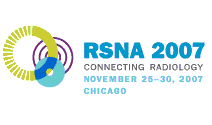
Abstract Archives of the RSNA, 2007
Christian Rosenberg MD, Presenter: Nothing to Disclose
Christiane Weigel MD, Abstract Co-Author: Nothing to Disclose
Ralf Puls MD, Abstract Co-Author: Nothing to Disclose
Katrin Hegenscheid, Abstract Co-Author: Nothing to Disclose
Tom Bollmann, Abstract Co-Author: Nothing to Disclose
Norbert Hosten MD, Abstract Co-Author: Nothing to Disclose
Pulmonary metastases develop in 30-50 % of all cancer patients. Local treatment of distant tumor metastases as part of a multimodal cancer therapy is known to deliver a survival advantage as shown in surgical studies with 5-year survival rates between 20 and 50 % after resection. Minimally invasive procedures as percutaneous laser-induced thermal ablation are still to proove their clinical relevance.
69 patients with pulmonary metastasis of different primaries underwent laser-induced thermal ablation in an ongoing study. Therapies comprised an overall 142 percutaneous procedures to treat a total of 113 lung lesions. Therapies were stated technically complete if all known lesions were treated with an adequate and size-related energy impact, as been evaluated in earlier studies. Survival rates and Kaplan-Meier curves were calculated.
Excluding 5 patients with later surgical resection we found an average survival of 443 days (1 to 1944 days). More than half of all patients were still alive 2 years after first therapy. Average survival significantly increased to 607 days (1 to 1944 days) if those patients were excluded who, for different reasons, received technically incomplete treatment of their disease.
Laser-induced thermal ablation of lung metastases leads to a measurable survival advantage in patients who meet strict inclusion criteria for therapy eligibility. Presented numbers are read with respect to a very inhomogeneous patient collective and a procedure-specific learning curve after 6 years of experience. At the same time there is a reasonable expectation of percutaneous thermal ablation to become a standard modality in multimodal cancer therapy. Prospectively randomized studies are still to be evaluated.
Percutaneous thermal ablation of lung metastases is a safe and effective procedure in multimodal cancer therapy. Still there is a leck of prospectively randomized studies.
Rosenberg, C,
Weigel, C,
Puls, R,
Hegenscheid, K,
Bollmann, T,
Hosten, N,
Laser-induced Thermal Ablation of Lung Metastases: Survival Rates after 6 Years. Radiological Society of North America 2007 Scientific Assembly and Annual Meeting, November 25 - November 30, 2007 ,Chicago IL.
http://archive.rsna.org/2007/5007003.html

